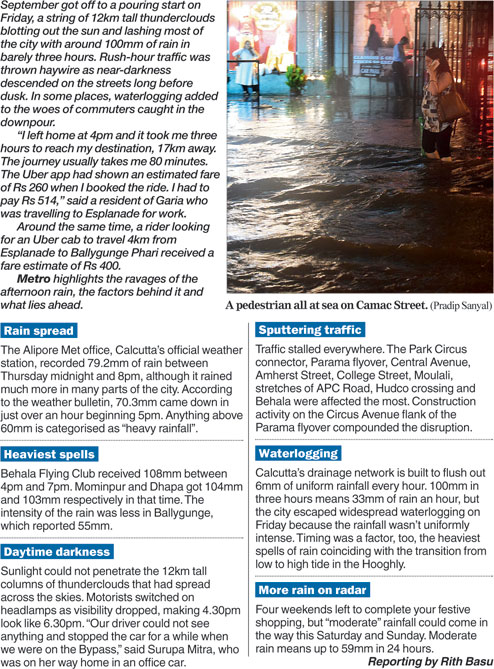
July 16: Babus and businesses aren't the only ones racking their brains over the complex transition to GST.
Some Calcutta University professors have been almost as busy to ensure the smooth passage of the uniform goods and services tax into the commerce syllabus.
The long list of indirect taxes that GST replaced on July 1 forms a chunk of the undergraduate and postgraduate commerce syllabi. The revised BCom honours syllabus under the choice-based credit system has two papers on taxation - I and II - that students are required to write in the fourth (second year) and fifth semesters (third year) respectively.
One of these papers covers the gamut of indirect taxes that have made way for GST. Calcutta University still has reasonable time to replace those topics with GST-related chapters for the undergraduate programme but needs to hurry up with the required changes to the MCom syllabus. This is because indirect taxation is taught at the postgraduate level in the first year and MCom classes are scheduled to start in three weeks.
The chapter "Taxation: Laws and Planning" for first-year MCom students covers central excise duty, customs duty and service tax.
Calcutta University's dean of commerce, Dhrubaranjan Dandopat, admitted that his team was racing against time to replace chapters on the old system of indirect taxation with those on the intricacies of GST. "The faculty council of commerce would be meeting soon to discuss this," he said.
In BCom, the Taxation-II paper carries 100 marks and covers topics such as Central Excise in unit 2, West Bengal Value Added Tax (VAT) in unit 3, Customs Tax in unit 4 and Central Sales Tax in unit 5.
"Taxation-I covers direct taxes like income tax and those will continue to be taught as they were. But we have to revamp the Taxation-II syllabus that deals with indirect taxes," Dandopat said.
The BCom syllabus uploaded to the Calcutta University website carries a note below the portion mentioning the topic Indirect Tax: Laws and Practice. "This paper will be replaced by goods & service tax law whenever the law is enforced and accordingly the revised syllabus will be announced. Latest edition(s) of the books may be read," the note says.
Asked why GST had not been incorporated into the BCom syllabus when it was being revised in May for the rollout of the choice-based credit system, pro vice-chancellor (academic) Swagata Sen said there was no way of being sure until GST took effect. "We could not introduce GST till it was formally rolled out," said Sen, a former dean of commerce.
The university has yet to draw up a list of textbooks that undergraduate and postgraduate students have to study post-GST.
On whether teachers were adequately informed on GST, the pro vice-chancellor (academic) said: "We will be inviting guest faculty for MCom classes. If needed, we can have a refresher course."
At the undergraduate level, colleges have started preparing to train teachers. "We have asked an expert who has published papers on GST to address our teachers during a workshop on Monday. We plan to hold a symposium on GST with a senior official of Balmer Lawrie. The guest, who is a former student of our college, will give a lecture on GST," said Sandip Pal, principal of City College of Commerce & Business Administration.
A teacher at Goenka College of Commerce said the institute would be holding workshops on GST for the teaching staff.










